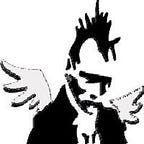Caught Thinking Redux (R.I.P. Edward de Bono)
My parents’ refusal to allow me to be a lazy thinker was painful for us all but, ultimately, I believe, successful. And learning to program at an early age certainly played its part in honing my skills re the separation of concerns. But de Bono was also a significant influence.
He was, inevitably, controversial … frequently (at least appearing) arrogant and his self-promotion could be viewed as less than seemly, … but, although it became fashionable (amongst academics especially) to dismiss it, the formalisation of processes for the analysis of our thinking was a significant augmentation of the cognitive toolkit, in my opinion — above all, you don’t need a qualification in Psychology or Education to make positive use of his process, just an open mind.
So, you’ll appreciate that, whilst I’m not fawningly uncritical myself, neither am I too impressed by many of his wouldbe detractors: he never claimed that any specific result of the processes he suggested would necessarily be flawless, merely that a rigorous approach to thinking about the processes of thinking itself would overcome the limitations of extant education systems and the thinking that resulted from imposing them to the exclusion of any others. I’m a great proponent of critical thinking … but you actually need to be good at it, if you’re gonna impress me … and the essential first step, as far as I’m concerned, is that your thinking be rigorously critical, not self-satisfied. When you look at academic objections that he took a pragmatic approach to creativity … concerning himself with developing it, rather than scientifically testing it … well, his point was that academia stifles it, so, “duh” — to complain that a pragmatist takes a pragmatic approach is intellectually destitute. Moreover, if you want to test the efficacy of the approach, you can’t complain that someone else (de Bono himself) isn’t doing it, you measure the results of applying the methodology yourself. And if, furthermore, having done so, you determine that, whilst there is little evidence of an approach achieving anything more than its stated goal, the data indicate that the approach does, in fact, achieve that specific goal then, according to the scientific method, what you’ve done is empirically disprove the null hypothesis; so what, exactly, is your point other than that you spy, with your little eye, something that would begin with the letter ‘x’, if only it weren’t spelled differently to begin with? ¹
Was he unfailingly right? Certainly not.
Did he make some interesting, pragmatic suggestions that might well be worth considering? I’d say the answer to that one were a resounding ‘yes’. If he achieved no more than to encourage people to question their own thinking, that’s more than will ever be achieved by rote learning and the rejection of any approaches that don’t adhere to the prevailing orthodoxy of the day but, fallible though they may have been … unlike oh, so many, critics … he actually provided suggestions as to how to ameliorate the problem too — anyone can apply critical thinking and find the flaws … actually building a better mousetrap afterwards, on the other hand, requires an altogether different skillset.
Either way around, however, the impact of his contribution is undeniable.
R.I.P. Edward de Bono — so long and thanks for making me think.
